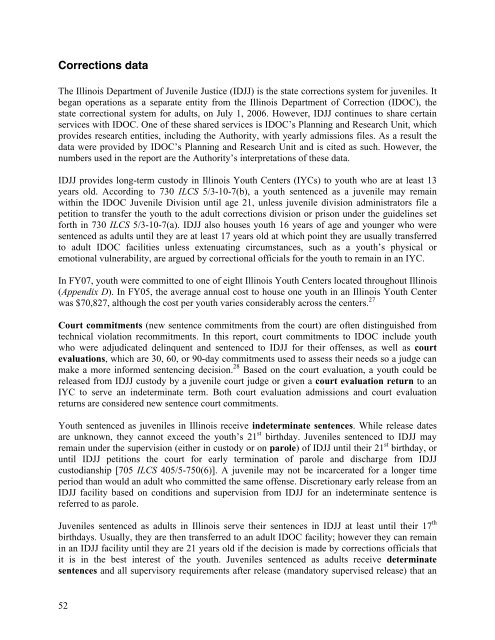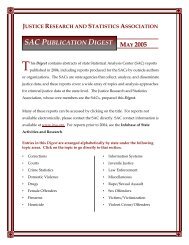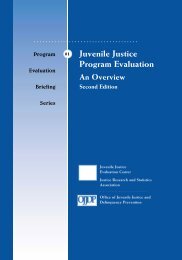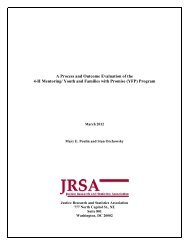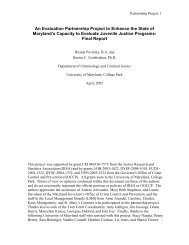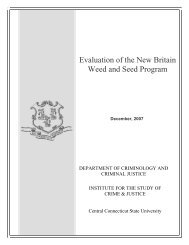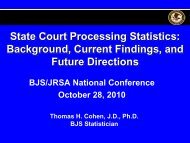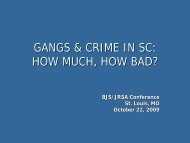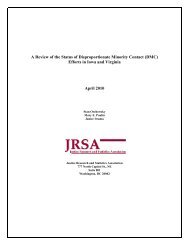Juvenile Justice System and Risk Factor Data - Illinois Criminal ...
Juvenile Justice System and Risk Factor Data - Illinois Criminal ...
Juvenile Justice System and Risk Factor Data - Illinois Criminal ...
Create successful ePaper yourself
Turn your PDF publications into a flip-book with our unique Google optimized e-Paper software.
Corrections data<br />
The <strong>Illinois</strong> Department of <strong>Juvenile</strong> Justi ce (IDJJ) is the state corrections system for juveniles. It<br />
began operations as a separate entity from the <strong>Illinois</strong> Department of Correction (IDOC), the<br />
state correctional system for adults, on July 1, 2006. However, IDJJ continues to share certain<br />
services with IDOC. One of these shared services is IDOC’s Planning <strong>and</strong> Research Unit, which<br />
provides research entities, including the Authority, with yearly admissions files. As a result the<br />
data were provided by IDOC’s Planning <strong>and</strong> Research Unit <strong>and</strong> is cited as such. However, the<br />
numbers used in the report are the Authority’s interpretations of these data.<br />
IDJJ provides long-term custody in <strong>Illinois</strong> Youth Centers (IYCs) to youth who are at least 13<br />
years old. According to 730 ILCS 5/3-10-7(b), a youth sentenced as a juvenile may remain<br />
within the IDOC <strong>Juvenile</strong> Division until age 21, unless juvenile division administrators file a<br />
petition to transfer the youth to the adult corrections division or prison under the guidelines set<br />
forth in 730 ILCS 5/3-10-7(a). IDJJ also houses youth 16 years of age <strong>and</strong> younger who were<br />
sentenced as adults until they are at least 17 years old at which point they are usually transferred<br />
to adult IDOC facilities unless extenuating circumstances, such as a youth’s physical or<br />
emotional vulnerability, are argued by correctional officials for the youth to remain in an IYC.<br />
In FY07, youth were committed to one of eight <strong>Illinois</strong> Youth Centers located throughout <strong>Illinois</strong><br />
(Appendix D). In FY05, the average annual cost to house one youth in an <strong>Illinois</strong> Youth Center<br />
was $70,827, although the cost per youth varies considerably across the centers. 27<br />
Court commitments (new sentence commitments from the court) are often distinguished from<br />
technical violation recommitments. In this report, court commitments to IDOC include youth<br />
who were adjudicated delinquent <strong>and</strong> sentenced to IDJJ for their offenses, as well as court<br />
evaluations, which are 30, 60, or 90-day commitments used to assess their needs so a judge can<br />
make a more informed sentencing decision. 28 Based on the court evaluation, a youth could be<br />
released from IDJJ custody by a juvenile court judge or given a court evaluation return to an<br />
IYC to serve an indeterminate term. Both court evaluation admissions <strong>and</strong> court evaluation<br />
returns are considered new sentence court commitments.<br />
Youth sentenced as juveniles in <strong>Illinois</strong> receive indeterminate sentences. While release dates<br />
are unknown, they cannot exceed the youth’s 21 st birthday. <strong>Juvenile</strong>s sentenced to IDJJ may<br />
remain under the supervision (either in custody or on parole) of IDJJ until their 21 st birthday, or<br />
until IDJJ petitions the court for early termination of parole <strong>and</strong> discharge from IDJJ<br />
custodianship [705 ILCS 405/5-750(6)]. A juvenile may not be incarcerated for a longer time<br />
period than would an adult who committed the same offense. Discretionary early release from an<br />
IDJJ facility based on conditions <strong>and</strong> supervision from IDJJ for an indeterminate sentence is<br />
referred to as parole.<br />
<strong>Juvenile</strong>s sentenced as adults in <strong>Illinois</strong> serve their sentences in IDJJ at least until their 17 th<br />
birthdays. Usually, they are then transferred to an adult IDOC facility; however they can remain<br />
in an IDJJ facility until they are 21 years old if the decision is made by corrections officials that<br />
it is in the best interest of the youth. <strong>Juvenile</strong>s sentenced as adults receive determinate<br />
sentences <strong>and</strong> all supervisory requirements after release (m<strong>and</strong>atory supervised release) that an<br />
52


